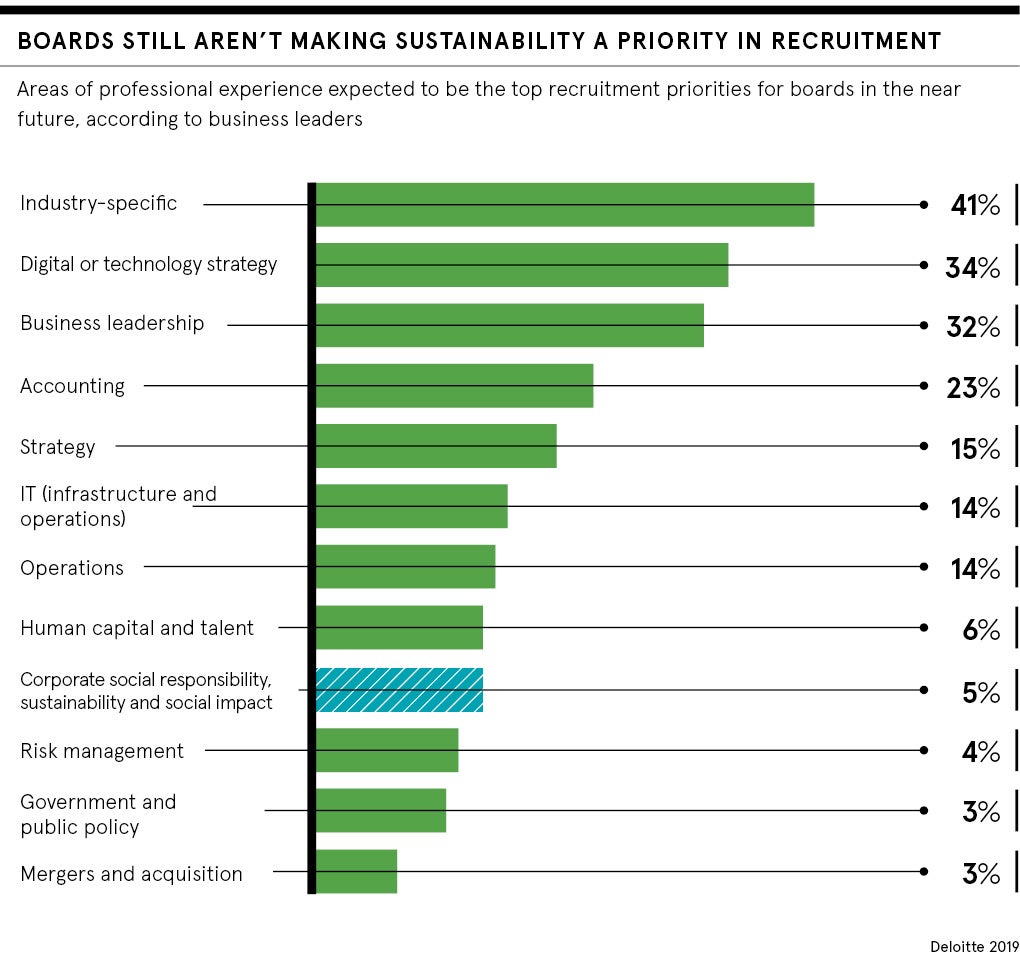Communication, emotional intelligence and problem-solving are just some of the attributes companies currently prize when looking for talent. However, it’s recently emerged that sustainability recruitment is being overlooked in the interview room, which could come at a real cost for any company not making it a procurement priority.
The disconnect has been highlighted by research released earlier this year by executive recruitment specialists Russell Reynolds, which revealed that out of 1,500 appointments in 2019, only 2 per cent of role profiles specified a need for sustainability credentials as a candidate requirement.
“Conversations around sustainability have never been louder, yet this is not always translating into action on the ground,” says chief executive Clarke Murphy.
“Sustainable business cannot happen without sustainable leadership and change will only occur if companies find leaders with the right skills and motivations to drive sustainability outcomes alongside financial success. This will require a radical rethink in the way board and C-suite leaders are selected.”

Of course, the rise of the chief sustainability officer role in the C-suite has been marked of late, but Murphy believes that to create a truly sustainable company, boards must go further.
“Increasingly, companies that do not live and breathe their values are called to task by their own employees. This is not just grumbling around the watercooler. When employees complain today, they do it on social media, for everyone to see. If a company brands itself as supporting the environment, but employees know executives do not act that way, they are going to tell the world,” he warns.
Informing the recruitment team
This isn’t the first time human resources departments have had to take a pivotal role in future-proofing an organisation to cope with emerging market pressures.
Murphy draws an interesting parallel between the necessary shift towards sustainability recruitment and the digitalisation revolution of a decade ago when business started to wake up to the fact that hiring candidates with data acumen would be essential to growth. That’s when we began to hear about companies hiring chief digital officers and chief data officers, roles that are now the norm.
However, it didn’t stop with C-suite appointments and companies began to respond to the changes by hiring candidates, with digital competency, at all levels.
Similarly, companies need to adapt their procurement policy to focus on the sustainability issues that are particular to their business practices so they can draw on that talent pool in coming years.

However, a sustainability recruitment strategy isn’t just the opportunity to align a business with sustainability thinking because, as we move into 2020 and beyond, it will also become a necessity for any organisation that wants to attract top talent.
By 2025, millennials will comprise three quarters of the workforce and they bring with them a set of standards, confirmed by the 2016 CONE Communications Employee Engagement Study, which found 64 per cent of millennials wouldn’t take a job at a company that doesn’t have a strong sense of corporate social responsibility.
The successful candidate will choose you
There has been a quiet revolution going on when it comes to hiring and savvy procurement teams are realising that as much as they are recruiting talent, the talent is also recruiting them.
“Hiring managers who can’t articulate their company’s sustainability credentials and goals will find it harder to attract high-quality candidates as they will simply go somewhere that does,” argues executive graduate talent engagement specialist Amelia Jory.
“Every day I talk to candidates who are looking for their dream role. What’s encouraging is that the conversation rarely focuses entirely on salary, and there’s one ‘must have’ that comes up time and time again and that’s sustainability.”
HR departments also have to ensure they not only secure the talent through sustainability recruitment, but that they retain and maximise it in the coming years by implementing coaching and mentoring schemes, and instigate a learning culture where sustainability knowledge is successfully shared.
The goal is simple, but it’s time critical. Identifying sustainability-focused leaders and corporate activists today will ease the environmental burden of tomorrow. It will present the C-suite with a massive opportunity to inject sustainability into the very DNA of their business.

Informing the recruitment team






